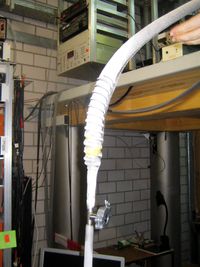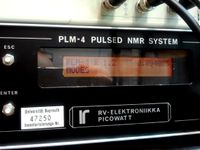Heike R2012-09 R67
From KIP Wiki
⧼kip-jumptonavigation⧽⧼kip-jumptosearch⧽
NEW
- Renewed and improved noise thermometer.
- The wiring for four Double-Channel-Squids is installed.
- Two more stainless steel Coax-Cables are installed with their own port at room-temperature. The are numbered #5 and #6. Up to now they end at the mixing chamber and are connected to each other.
- Two semi-rigid coax-cables were installed, too.
- Filter-boxes I, II and VI were improved by adding a second coil at the input (cryo-end) of the filter circuit. The coils were manufactured by Würth Electronik, Part No. 744221, 2000H; 600mA; 0.42
TEST
- Testing Pt-NMR. Coax #1 and #3 is connected with a special box. Inside this box the inner conductor of coax #1 is grounded and the inner conductor of #3 is feed through. For details see Pt-NMR Log-Book page 20. At first glance it seems like the device works at Curie-Mode.
- In spite of many attempts with different setups it isn't possible to measure in the Korringa-Mode with the PLM-4 so far.
- Heating by RF-Signal causes a significant parasitic heat input on the mixing chamber and on the Cu-Stage. Several tests were done to prove this. See e.g. logbook: 16.03. or 22.03.2012.
- NEW LOWEST TEMPERATURE ACHIEVED: TNMR ~ 85 K (14.03.)
- New Filter-Design for some Boxes.
TIME TABLE
- 28.02.2012: FIRST DAY - CLOSING, CLEANING & PRECOOLING
- Closing cyrostat and dewar. Cleaning/pumping lines.
- Precooling with 50l LN.
- 29.02.2012: SECOND DAY - LIQUID HELIUM
- 07:50 : Status = TDewar=207K, TMC,Si=216K, TMagn,l=217K, pVC=2.15mbar
- 09:55 : Start filling LHe
- 17:00 : Status after two cans (188.8l LHe) =TMC,Si=80K, TMagn,u=50K, pVC=0.45mbar
- 01.03.2012: THIRD DAY - MIX IN
- 08:00 : Status = TDewar=78K, TMC,Si=80K, TMagn,u=81K, pVC=0.67mbar, connect 3rd can LHe
- 11:45 : TMC,Si=4K, start pumping vacuum vessel.
- 14:00 : Start condensing mix. T1=688mbar, T2=700mbar, T3=0mbar, p4=774mbar.
- 14:10 : 100% He-Level. Total consumption to reach this level: 428.2 litres (Five cans) .
- 16:20 : Close Heat-Switch (IPCS#4=1.5A, IH=0.5mA) @ TRuOx=700mK
- 17:20 : All mix is in, all pumps are running. ISTILL=3.0mA, TRuOx=90mK
- 02.03.2012: 4th DAY
- Testing FPD
- Connecting and Testing Pt-NMR
- 05.03.2012: 1st RAMP MAGNET
- Satus : Heat switch is closed.
- 12:40 : IM= 40 A, heat switch closed (1,5 A)
- 07.03.2012: 1st DEMAG
- 11:04 : Open HS, Ti= 19.6 mK (corresponding to Noise Thermometer), Bi= 3.96 T
- 19:06 : IM= 0.6 A, TNMR ~ 389 uK, NT was disturbed by additional noise contribution in the frequency spectrum.
- 08.03.2012: 2nd RAMP MAGNET
- 12:00 : IM= 40 A, heat switch closed (1,5 A)
- 14.03.2012: 2nd DEMAG
- ! Changed setup of PLM-4! See NMR-textbook page 23
- 11:04 : Open HS, Ti= 14.95 mK (corresponding to Noise Thermometer), Bi= 3.96 T
- 19:06 : IM= 0.1 A, TNT ~ 300uK ( caused by disturbances !!! ), TNMR ~ 85 K (!!!) in Curie Mode.
- 17.03.2012: 3rd RAMP MAGNET
- 13:05 : Closing heat switch.
- 13:38 : IM= 40 A, heat switch closed (1,5 A)
- 21.03.2012: 3rd DEMAG
- 10:43 : Open HS, Ti= 19.23 mK (corresponding to Noise Thermometer), TNMR= 19.045 mK, Bi= 3.96 T
- 10:59 : Start Demag: TNT= 17.80 mK
- 16:16 : Stop Noise-Thermometer read-out due to massive external distributions by additional noise (SQUID-Radio Moscow :) ).
- 18:50 : IM= 0.3 A, TNMR ~ 240 K in Curie Mode.
- 22.03.2012: MIX OUT
- Some rf-heating tests
- 14:30 : Start putting mix in tank 1 and 2.
- 18:00 : After using babypump :T1=688mbar, T2=700mbar, T3=0mbar, p4=1032mbar.
- ALL MIX IS DUMPED IN OUR TANKS
TO DO
- Find correct setup of the PLM-4 Korringa-Mode.
- Improve Filter-Design!
- Reduce parasitic heating by rf-signals.
- Get rid of SQUID-Radio Moscow :)
- Remove partially plugged flow of cooling water



